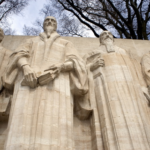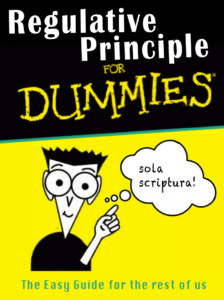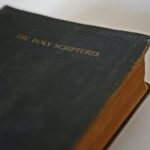Text: Acts 2:41-47
Priorities of God-sanctioned worship.

 Article: 7 Things I Love about Liturgical Protestant Worship by Silverio Gonzalez (original source here)
Article: 7 Things I Love about Liturgical Protestant Worship by Silverio Gonzalez (original source here)
Sometimes the idea of “formal worship” scares people. I hope to make that less scary. The Protestant traditions include Anglicanism, Lutheranism, the Reformed, and Presbyterianism. Although these traditions have important differences, they reflect important similarities in the way they worship. I could feel more or less at home in any of these traditions, so long as they are true to their Reformation heritage. A liturgy is an order of worship in which God gives grace in the gospel and we respond in faith, hope, and love.
1. I love that liturgical Protestant worship is shaped by the Gospel.
Common in Protestant liturgies is a movement from the law of God and our repentance to the Gospel. The Gospel announces our forgiveness and justification. A good liturgy is evangelical in the best sense in that it helps move the congregation through the ordinary patterns of the Christian life. I constantly feel the weight of the week’s sins lifted as I confess my sins in a prayer together with the congregation. Then I hear the pastor preach the gospel, telling me again that my sins are forgiven because of Christ alone.
2. I love that liturgical Protestant worship has specific prayers as part of the service.
In Protestant orders of worship, there is usually a prayer of adoration, a prayer of confession of sin, a pastoral prayer for the needs of the congregation, and a prayer of thanksgiving. Sometimes some of these prayers are expressed in song; other times the entire congregation reads a written prayer. The pastor leads the congregation in these prayers that reflect our unity. Through public prayer, we bear one another’s burdens. When I hear my pastor pray for me, I feel his love for the congregation, and me in particular.
3. I love that liturgical Protestant worship includes lots of Scripture reading throughout the service.
Usually there are readings from the Old and New Testaments, Psalms, Epistles, and Gospels. Sometimes the Psalms are sung. Protestant liturgies include a variety of arrangements and a number of Scripture readings. Hearing so much Scripture read in church is like being washed in God’s Word.
4. I love that liturgical Protestant worship includes the pastor preaching both the law and the gospel from the Bible.
A good sermon doesn’t just tell me about what happened in the past. A good sermon helps me to understand my life as a part of God’s story. A good sermon focuses on what Jesus did—and is doing—to save sinners like me. A good sermon shows me why Jesus had to die. A good sermon shows me how to respond in faith, hope, and love. Protestants preach God’s word of law to humble my proud heart and God’s gospel to show me my savior and remind me how God has promised to work in my life to save me from sin’s penalty and power.
5. I love that liturgical Protestant worship recites creeds.
If you have never been in a church that recites a creed like the Apostles’ Creed, then this is a great reason to visit. When we recite this creed, we recite something that reflects the basics of our faith. The pastor asks, “Congregation, what do you believe?” and we respond with, “I believe in God the Father Almighty….” We confess our common faith together. In this act we connect to the church past, present, and future. We are expressing the one faith that all Christians have sought to maintain for generations.
6. I love that liturgical Protestant worship sings old and new songs.
I love singing old songs, because they remind me of the different cultures and time periods in which God worked. I love singing new songs, because they remind me that the faith is still living, that Christianity is still vibrant today, and that God is still working. Singing new and old songs reminds me that God has promised to gather the nations as his people (Ps. 86:9).
7. I love that liturgical Protestant worship expresses a range of emotions.
Like the Psalms, Protestants know how to mourn, how to praise, how to ask God for our needs, and how to give thanks for what he has already given. When I come to church, I’m not forced to be happy or sad, but I get to express that weird mixture so common to Christians: joy and sorrow, praise and lament, and repentance and faith. I love that I get to express the way I actually feel, and am helped to express the ways I should feel, as I am taught to express the entire range of emotions that are part of the ordinary Christian life.
 Jeff is a senior editor for The Gospel Coalition. A native of Blairsville, Ga., Jeff holds a bachelor’s degree in journalism from The University of Georgia, a Master of Divinity in biblical and theological studies and a Ph.D. in historical theology with an emphasis on Baptist history from The Southern Baptist Theological Seminary, Louisville, Kentucky. He is pastor of New City Church in Louisville, KY. Jeff and his wife Lisa have been married for 19 years and have four children.
Jeff is a senior editor for The Gospel Coalition. A native of Blairsville, Ga., Jeff holds a bachelor’s degree in journalism from The University of Georgia, a Master of Divinity in biblical and theological studies and a Ph.D. in historical theology with an emphasis on Baptist history from The Southern Baptist Theological Seminary, Louisville, Kentucky. He is pastor of New City Church in Louisville, KY. Jeff and his wife Lisa have been married for 19 years and have four children.
I argued that the regulative principle of worship is a Baptist doctrine. But any Baptist worth his or her salt will ask the more salient question: But is it a biblical doctrine?
I want to argue that it is in fact a biblical doctrine and give a brief biblical defense from 32,000 feet. As I sought to show last time, Baptist confessions have articulated it and numerous important figures who have roamed the landscape of the Baptist tradition held it in earnest.
Granted, there is not a single text that may be accessed which says, “You shall only use in gathered worship those elements taught by precept or example in Scripture.” But if you take the overall witness of Scripture as to how God expects to be worshiped, I believe a strong case may be made.
Such passages include:
The first four commandments found in Exodus 20:3-4, 7-8. All deal largely with worship. This tells us worship of God is a primary issue, one that God takes with blood-earnest seriousness. Therefore, we should treat it with the utmost care. There should be no place for flippant or breezy worship among the people of God.
The details given by God in the construction of the furniture and garments of worship in Exodus 25-30. In Exodus 30:33, 38, God promises the death penalty for the misuse of anointing oil and incense. From this, it seems that God is meticulous in how he ought to be worshiped.
The warning of the Israelites in Deuteronomy 12:30-32 not to get their ideas of worship from the world around them, but only from God’s revelation. This command is relevant for the church today for many obvious reasons. It is certainly admirable to want to appeal to the lost and the church that neglects the Great Commission is disobeying the clear command of Scripture. But, we must remember the wise axiom: What you win them with is what you win them to. The same principle applies to worship.
The death of Nadab and Abihu in Leviticus 10:1-3. God struck them dead for offering “strange fire” to the Lord. This illustrates the seriousness with which God takes the worship of himself.
The disobedience of Saul in offering the sacrifices Samuel was to have offered in 1 Samuel 10:8 and 13:8-13. Continue reading
 Two articles that seek to apply the regulative principle of worship to the issue of movie clips (and other things):
Two articles that seek to apply the regulative principle of worship to the issue of movie clips (and other things):
Article #1: What about Movie Clips? Applying the Regulative Principle by Aaron Menikoff (original source here), senior pastor of Mt. Vernon Baptist Church in Sandy Springs, Georgia.
I had been a pastor for just a few months when a faithful church member sought me out to discuss the use of media in the services. He had led previous pastors to incorporate video and sound clips, and he wanted to be of help to me. He started off with a question kind of like this:
“So, what do you think about movie clips in the services?”
“Well, I really hadn’t planned on using media in the services.”
“Really? I’ve been involved in worship for quite some time, and it’s a pretty effective way to communicate.”
“Yeah, I don’t doubt that. But I’m afraid it might distract people from the heart of the service: the singing, preaching, and praying of the Word.”
“I wouldn’t think of it as a distraction, more of an addition, it makes the whole service better.”
“You might be right, but I really want our focus to be on the power of God’s Word to engage and excite us, so I’m going to stay away from movie clips.”
That’s about how the conversation ended. We were two grown men who both love the Lord but with different viewpoints on what would most honor God and be helpful to this local church. If you were in my shoes, how would you have answered his question?
Over the years, I’ve been asked to weigh in on many such issues related to our Sunday morning service.
Should we have Independence Day bunting? I said no, after figuring out what bunting is.
Christmas decorations? I said yes.
Dramatic Scripture readings? No.
A children’s choir? Yes, a couple times a year.
A collection box in the foyer? No.
Handbells? Yes.
Movie clips? See above.
As you can probably tell from these examples, I came to an established church with its own customs and traditions. If you’re planting a church, I suppose you’re more likely to be asked your opinion on incense, an art gallery in the foyer, and cutting edge or even secular music.
I’m less concerned that you reach the same conclusion I have on any of these examples. What I do want you to realize is that Scripture is not silent about corporate worship.
FIVE GUIDELINES FOR MAKING GODLY DECISIONS
The regulative principle helps me answer these kinds of questions. The regulative principle says that Scripture regulates what is permissible to do in public worship. And those who hold the regulative principle will approach each question carefully, asking not merely “What will God allow?” but also “What does God prefer?”
The following five guidelines, rooted in the regulative principle, have helped me to address which practices appropriately honor God and help his people in our weekly gatherings.
1. Corporate worship is Word-centered.
First, corporate worship is Word-centered. After Paul told Timothy of Scripture’s power to change lives (2 Tim. 3:16–17) he offered this simple exhortation: “Preach the word” (4:2). My most important pastoral duty is to lay Scripture before my church, confidently knowing that the Spirit can apply it to people’s lives and produce spiritual maturity.
A Christian gathering should not be merely “biblical” in some general, abstract sense. It should be so saturated with Scripture that it is obvious to everyone that we believe God works powerfully through his Word, as we preach the Word, sing the Word, and pray the Word. I don’t want to endorse anything that will distract us from Scripture. Continue reading
 Unlike the author of this article, I am not a Presbyterean, nor am I a part of the PCA, but the principles outlined here by Steve Tipton concerning the Regulative Principle of Worship, I find helpful.
Unlike the author of this article, I am not a Presbyterean, nor am I a part of the PCA, but the principles outlined here by Steve Tipton concerning the Regulative Principle of Worship, I find helpful.
Article: The Regulative Principle of “Liturgical Sameness?” by Steve Tipton (original source here)
In the Presbyterian Church in America (PCA)–the denomination in which I serve as a minister of the Gospel–quite a number of ministers lament the fact that you can attend five of our churches (all within the same city) only to have five very different worship experiences. Additionally, these same ministers lament what seems to be an utter lack of any kind of corporate worship identity within the denomination as a whole. It is indisputable that there is a lack of uniformity in worship practices within the denomination. In light of that truth, the questions that we should be asking are: “Why is there such diversity regarding worship practices in the PCA?” and “Should we view this diversity as a negative thing?”
Some have suggested that the basis for such divergence in worship practices is due, at least in large part, to a lack of understanding of the Regulative Principle of Worship (RPW)–a principle that is found in Chapter 21 of the Westminster Confession of Faith. Others have suggested that it is due to the fact that the “Directory for the Worship of God” (a section of the PCA’s Book of Church Order) is mostly, non-binding upon the church. Still others have intimated that it is due to what they perceive to be a descent into the dark valley of the Judges, where everyone merely does what is right in their own eyes.
Whatever one may say, of this much we may agree: There is a lack of understanding of the RPW on the part of many who enter into this debate. The PCA’s “Directory for Worship” functions merely as an advisory document; and, apart from chapters 56-58, the Directory has no “force of law” in the PCA. Regardless of that fact, I want to make the following observations about the the greater issues that lie behind the widespread divergence in worship practices in the PCA:
First, I have observed an almost universal lack of understanding as to what the Regulative Principle of Worship actually is. Therefore, there is a lack of understanding of what the RPW is not. In the first paragraph of chapter 21 of the WCF, the Divines explain that however much worship is owed to God by mankind, He must only be worshiped according to the way he has instituted in his Word. God may not be worshipped according to “the imaginations and devices of men or the suggestions of Satan.” Worship, then, must be conformed to the instructions given in Scripture.
As we proceed through the various paragraphs in chapter 21, we discover the various activities (i.e. the “elements” of worship) that are given in the Word: Prayer, the reading of Scripture, the preaching (and conscionable hearing) of the Word, the singing of psalms, and the sacraments as ordinary parts of worship, along with oaths, vows, fasting and thanksgiving upon special occasions.
Interestingly the WCF says nothing about an order, or “liturgy,” for our worship services. It also says nothing about which instruments, if any, should be used to accompany the congregation in their singing. Therefore, it ought to strike us as awfully strange and “unconfessional” to argue that those churches that have a particular liturgy and uses traditional hymns accompanied by a piano are worshipping according to the RPW, whereas those churches that have an different liturgy and sing contemporary hymns accompanied by a guitar – even (dare I say it) an electric guitar – are not worshipping according to the RPW. To be sure, there is nothing in Scripture that gives us the positive warrant to use of a Les Paul plugged into a Marshall half stack turned up to eleven to assist the congregation in singing praise to God. But, to be fair, neither would the Apostle Paul know what a piano was if it ran him over as it rolled down the street. Yet either (at least theoretically) can be used to accompany congregational singing–provided they are circumstances of worship–since they do not run contrary to the RPW.
The RPW tells us what elements are to be present during worship, but the RPW does not tell us how those elements may be circumstantially accompanied and performed. Neither, frankly, does Scripture. There is great freedom to plan and arrange worship, then, within the framework of the RPW. To argue otherwise is to go beyond what the RPW was designed to teach. Therefore to go beyond the basic principles of the RPW is to go beyond Scripture.
Second, I wonder if any of those who refer to the “Directory for the Public Worship of God” in this debate have actually read it. This applies both to those who point to its “unconstitutional” status as well as to those who raise irate opposition when someone suggests that it should become constitutional in our denomination. It is actually quite benign. I read nothing in it by way “regulative principles” that I do not find in the WCF. What it does contain is a wealth of helpful advice-much of which is couched as pious advice-for worship. It prescribes no specific liturgy. It demands no particular forms. No doubt those who state differences with the Westminster Standards on issues related to the Sabbath would have similar concerns with Chapter 48 – yet even those who find the Standards too restrictive on issues of recreation would find much helpful advice in that particular chapter for every other aspect of Sabbath keeping.
I mention the “Directory of the Public Worship of God”, however, to remind those engaged in the worship wars that the Directory does not demand monolithic uniformity in our worship service. Neither the directory nor the confession give the kind of rule and guide that would create any kind of liturgical uniformity such that you would finally be able to attend five different PCA churches and not experience five different worship liturgies or five different expressions of congregational singing. As Derek Thomas has aptly explained in his 2010 Tabletalk article, “The Regulative Principle of Worship:”
[The RPW] “does not commit the church to a ‘cookie-cutter,’ liturgical sameness. Within an adherence to the principle there is enormous room for variation–in matters that Scripture has not specifically addressed (adiaphora). Thus, the regulative principle as such may not be invoked to determine whether contemporary or traditional songs are employed, whether three verses or three chapters of Scripture are read, whether one long prayer or several short prayers are made, or whether a single cup or individual cups with real wine or grape juice are utilized at the Lord’s Supper. To all of these issues, the principle “all things should be done decently and in order” (1 Cor. 14:40) must be applied.”
Third, given that the PRW and the Directory do not, in themselves, provide a set liturgy for the organization of worship (and, therefore, for organizational uniformity within the denomination), upon what basis are local churches to decide how to organize their worship? Clearly, they are to be guided by the elements as they are laid out in Scripture. Clearly, the RPW provides a grid though which to understand both what elements are to be included and what potential elements are to be precluded. And, clearly, the constitutional sections of the “Directory for Public Worship” gives specific guidance to their respective elements. But what else is there to which we are to adhere?
Continue reading
 What follows is a very helpful series of articles by Dr. Ligon Duncan, written in July 2014 at his blog of ligonduncan.com:
What follows is a very helpful series of articles by Dr. Ligon Duncan, written in July 2014 at his blog of ligonduncan.com:
Why how we worship matters
July 12, 2014
Protestants have always believed that how we worship, the manner of our public worship, matters. The main reason for this is because Protestants believe that the Bible itself, in both the Old and New Testaments, commands a number of important things about how we are to conduct ourselves in gathered worship.
There are, of course, historical reasons for this interest in the manner, or how, of public worship as well. For instance, the Protestant reformers believed that the way you worship actually influences and reinforces what you believe. That is one reason they were so interested in reforming the worship practices of the church in their day. They did not believe that you could make a Protestant with Roman Catholic worship. More deeply, they believed that much of Roman Catholic worship was unbiblical (and that it undermined the Gospel), and hence they wanted to reform congregational worship according to the Bible. Indeed, John Calvin said that there were two main issues at stake in the reformation: biblical worship and justification by faith (in that order!). So, for Calvin, how we worship is no small matter.
But isn’t focusing on “how” we worship a little legalistic? Worship is a matter of the heart, right?, and so doesn’t focusing on the outward manner of worship get us off on the wrong track. Well, I hear that objection and I am not unsympathetic to its concerns. Externalism and formalism are both serious problems when in comes to public worship. Certainly the Bible vigorously and extensively condemns hypocritical external piety and shows a prime concern for the state of our hearts in approaching God. But the Bible also show a serious concern about the manner of our worship. Heart and form need not be set in opposition. The Bible shows an interest in both.
Furthermore, Protestants are not concerned with the manner, or how, of worship, with the forms and circumstances of public praise, simply for their own sake, but for the sake of the object and aim of worship.
In other words, Protestants understand that there is an inseparable connection between way we worship and whom we worship. It has often been said that the Bible’s teaching on idolatry shows that we become like what we worship, but it also indicates that we become like how we worship, because the how and the who of worship are linked.
The Protestant reformers (from whom we have learned much about Scripture) understood two things often lost on moderns. First, they understood that the liturgy (the set forms of corporate worship), media, instruments and vehicles of worship are never neutral, and so exceeding care must be given to the “law of unintended consequences.” Often the medium overwhelms and changes the message.
Second, they knew that the purpose of the elements and forms and circumstances of corporate worship is to assure that you are actually doing worship as it is defined by the God of Scripture, that you are worshiping the God of Scripture and that your aim in worshiping Him is the aim set forth in Scripture.
So the Protestant approach to liturgy (not a word Calvin liked, but by it we simply mean: the order of service) is based on this foundation. Protestants care about how we worship not because we think that liturgy/order of service is prescribed, mystical or sacramental, but precisely so that the order of service can assist and get out of the way of (rather than distract and impede) the gathered church’s communion with the living God. The function of the order of service is not to draw attention to itself but to aid the soul’s communion with God in the gathered company of the saints by serving to convey the word of God to and from God, from and to His people. Continue reading
 A Banner of Truth article by Terry Johnson (original source here)
A Banner of Truth article by Terry Johnson (original source here)
Jesus rejects the worship of the Pharisees saying their worship was futile because they were teaching their doctrines rather than God’s doctrines. They were worshiping according to their will rather than according to His will.
In Taylors, South Carolina on March 11th 2003, the Rev. Mr. Terry Johnson, Senior Minister at Independent Presbyterian Church in Savannah, Georgia, opened the spring theology conference for Greenville Presbyterian Theological Seminary with an address on the Regulative Principle of Worship (RPW).
A minister in Central Georgia Presbytery of the Presbyterian Church in America (PCA), Mr. Johnson began with the subject of the importance of worship, stating, “You can make a case that there is a true sense that the whole Bible is the story of the establishment of the true worship of the true God.” Citing John 4:22, Mr. Johnson proceeded to defend the biblical basis for the regulative principle.
Because the whole Old Testament is in a sense the story of the establishment of the true worship of the true God, Biblically there could be no more important subject, and certainly that is also true of our Reformed tradition.
Carlos Eire, in his War Against the Idols, reminds us that the central focus of the Protestant Reformation was this very issue. Furthermore, the Puritans and the British monarchs battled over it for 100 years, and today the importance of worship is being underscored again. Continue reading
we ask the question within the context of our covenant relationship with God: for what purpose did an all-sufficient God, who needs nothing besides Himself, decide to create us? The Westminster Larger Catechism asks the question this way: “What is the chief and highest end of man?” It answers: “Man’s chief and highest end is to glorify God, and fully to enjoy him forever” (Q&A 1; cf. WSC, Q&A 1). In short, we exist not only to give God glory, as we speak to God in worship through prayer and praise, but also to enjoy Him as He speaks to us in worship through Word and sacrament.
Because Scripture is our ultimate authority, it defines not only our theology but our piety, what we believe about God and how we respond to Him. Piety, then, is our grateful response to what God has done. John Calvin described piety as “that reverence joined with love of God which the knowledge of his benefits induces.” The psalmist spoke this way when he said, “Worship the Lord with reverence, and rejoice with trembling” (Ps. 2:11, NASB). The chief and highest way this reverential love is expressed is in public worship.
One aspect that distinguished the Reformed churches from their co-Protestant Lutheran churches was their zeal to engage in the worship of God only on the basis of what the Word of God commanded or implicitly required. To adapt Abraham Lincoln’s “Gettysburg Address,” the Reformers believed that worship is of God, by God, and for God. For the Reformed, this meant that all unbiblical ceremonies were abolished for public worship. In fact, Calvin was so adamant about this point that he said the entire project of the Protestant Reformation was about worshiping God in a way that was pleasing to Him. This point even led the great English matriarch, Queen Elizabeth I (1533–1603), to describe the Reformed churches on the continent of Europe as “more reformed” than the Lutheran churches.
The Belgic Confession of Faith links the Reformed churches’ belief in the sufficiency of the Word of God to the area of worship when it says, “For since the whole manner of worship which God requires of us is written in them at large, it is unlawful for any one, though an Apostle, to teach otherwise than we are now taught in the Holy Scriptures: nay, though it were an angel from heaven, as the Apostle Paul saith” (Art. 7). “The whole manner of worship which God requires” is found in the Scriptures. This means we come to worship on God’s terms, not ours; that we do in worship what God wants, not what we want.
Continuing in a later section, the Belgic Confession says: “… we reject all human inventions, and all laws which man would introduce into the worship of God, thereby to bind and compel the conscience in any manner whatever. Therefore we admit only of that which tends to nourish and preserve concord and unity, and to keep all men in obedience to God” (Art. 32).
The Word, then, contains all we need in order to know how to worship; therefore, we reject all human-made laws or elements of worship. This is most memorably and succinctly stated in the Heidelberg Catechism, which says:
What does God require in the second commandment?
That we in no wise make any image of God, nor worship him in any other way than he has commanded us in his Word. (Q&A 96)
Over the centuries, Reformed churches came to call these ideas the “Regulative Principle of Worship.” The Regulative Principle of Worship holds that we worship God in the manner He has commanded us in His Word. As the Westminster Confession says, “But the acceptable way of worshipping the true God is instituted by himself, and so limited to his own revealed will, that he may not be worshipped according to the imaginations and devices of men, or the suggestions of Satan, under any visible representations or any other way not prescribed in the Holy Scripture” (21.1).
In the Reformed churches, we hold to this principle because we take the Bible seriously. It is God’s Word to us for our faith, as well as for our worship and Christian life. Scripture alone is our ultimate rule, and it sufficiently gives us “all things that pertain to life and godliness” (2 Peter 1:3). So it alone governs the substance of what we do in worship.
In a 2013 Conference, Dr. Sam Waldron taught the following five sessions on this important theme:
1. The Framework of the Regulative Principle
2. The Foundation of the Regulative Principle
3. The Features of the Regulative Principle
4. The Focus of the Regulative Principle
5. The Fulfilment of the Regulative Principle